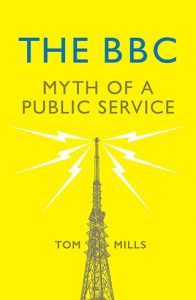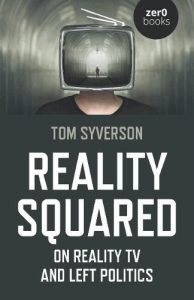Book reviews
Myths and News 
Tom Mills: The BBC: Myth of a Public Service. Verso £9.99.
Some people think the BBC is so left-wing and anti-British that they call it the Bolshevik Broadcasting Corporation. On the other hand, its recent fawning coverage of the death of the Duke of Edinburgh and the consequent disruption to TV and radio programmes attracted so many complaints that a special on-line form was set up to make it more straightforward to object. But of course that also led to comments such as,: how dare the BBC make it easier to complain about the treatment of a deceased member of the royal family.
As Tom Mills shows here, though, the BBC is very much part of the Establishment. Formed in 1922 as the British Broadcasting Company Ltd (it became a public corporation in 1927), it clearly took the government side during the General Strike. Many of its early top brass had military and/or intelligence backgrounds, and there were fairly close links with MI5. Security vetting of staff began in 1937 and continued till 1985, when it was exposed in the Observer. The World Service in particular was seen by the Foreign Office as an instrument of ‘soft power’. The BBC motto is ‘Nation shall speak peace unto Nation’, but its coverage has generally been pro-war, much more so than that of commercial television.
Down to the 1970s, it was ‘broadly tied to the social-democratic consensus’, but under the impact of Thatcherism it became ‘a neoliberal, pro-business, right-wing organisation’. There was far more reporting on business, with less attention to the concerns of workers: fewer industrial correspondents and fewer interviews with union representatives. Working at the BBC has itself become more casualised and precarious, as the Corporation has added more bureaucracy.
None of this is probably very surprising, but Mills gives a clear account of the development of the BBC and how it has been subjected to pressures from the government and other power-holders. The BBC News is dominated by Westminster politicians, and there is to some extent a revolving door with politics, which sees reporters going on to become MPs and ministers. Of course, the Establishment is not itself a monolithic entity, and the BBC reflects disagreements within it, being ‘an arena of conflict and contestation between different groups, especially rival factions of the elite’. In 1987, for instance, Alasdair Milne was forced to resign as Director-General, as the governors did not trust him to introduce the neoliberal overhaul they wanted.
The BBC is not directly a state broadcaster, but the government sets the licence fee, and this gives it a great deal of influence and power. Mills suggests it be placed on a statutory footing to avoid the periodic negotiations with government about its future, but that would make little if any difference to its role as a mouthpiece for capitalist interests.
 Squared Eyes
Squared Eyes
Reality Squared: On Reality TV and Left Politics, by Tom Syverson, Zero Books, 2021
Why bother watching ‘reality TV’? For Tom Syverson, there’s more to the genre than just the convoluted relationships among the latest set of pampered exhibitionists being followed by a film crew. He argues that we can watch ‘reality TV’ to reveal how our ideology, views and understanding of ‘truth’ have changed in these media-dominated times. ‘Reality television is reality squared; it’s a form of representing social reality that says something about social reality itself’ (p.14). In exploring the subject, Syverson draws on the writings of Jean Baudrillard, Slavoj Žižek, Fredric Jameson and David Shields, among other thinkers.
To underpin his discussion of particular ‘reality TV’ shows, Syverson maps out the ideological conditions within which they and the wider media sit. Following political theorist Jodi Dean, Syverson says that ‘the left was so effective in shaking the foundations of conservative social values, in trading sclerotic public morals and trust in objective truth for progressive social liberalism and postmodern relativism, that the entire landscape shifted’ (p.114). What the left felt were victories were assimilated into the mainstream: neoliberalism has turned ideals about diversity, feminism and gay rights into a source of profit for media pushing a ‘woke’ agenda, and the right has embraced postmodernism, which denies grand narratives and attracts conspiracy theories, fake news and ‘alternative facts’. Through this culture, ‘we relate to each other only by interfacing with our own fragmented, interlocking personal narratives’ (p.113). With reality seeming unreal, ‘reality TV’ is ‘the shade of popular entertainment that best conveys how living life seems to us right now’ (p.50).
Syverson explains how several American series highlight where leftist ideology has gone. An example of where postmodernism has taken us is The Hills, a docusoap about a group of friends in Los Angeles which ran from 2006 to 2010 and was revived in 2019. Unusually, those who appeared on the show acknowledged that their on-screen relationships were faked. As well as saying something about the performative nature of real relationships (p.65), for Syverson, this adds more layers to the question of how real ‘reality TV’ is: ‘as lies contradict and reinforce each other, a dialectic of deception unfolds between the characters, transferring them to higher and higher levels of simulation’ (p.57). He then applies Baudrillard’s views to say that this kind of postmodern media has changed the nature of our acceptance of what is ‘true’ or not. ‘Understanding reality television isn’t simply a matter of negotiating a conflict between fact and fiction; rather, the genre is about generating their synthesis’ (p.12).
Syverson’s discussion of other shows is related more closely to our everyday attitudes. Considering dating competition The Bachelor (2002 – ), he points out that behind its ‘decadent pageant of polyamory, deception, and performative melodrama’ (p.69) it enshrines the conservative view that love is a process towards marriage. A sizeable proportion of The Bachelor’s audience are young leftists who, on some level, feel guilty about watching it because they’re ambivalent about wanting to abolish or reclaim the institution of marriage. Watching the show acts as a release for this tension: ‘it provides the same psychological function as patriarchy, but rather than having to play it out in our real lives, we can do so using the hyperreal frame of reality television’ (p.81).
Syverson says that other questions about feminism are raised by The Real Housewives franchise (2006 – ). This series’ characters are examples of a type of feminist who has compromised by ‘shedding her radical tendencies and realigning her goals to fit more neatly with those of neoliberal capitalism’ (p.84). These ‘power feminists’ claim to be liberated by successfully balancing a career with domestic duties, even though their ‘freedom’ is to be exploited in employment well paid enough for them to outsource childcare and cleaning. The show expresses what is an ‘unattainable aspirational fantasy’ (p.89) for most women struggling to balance childcare with a ‘career’ which is low-paid and unfulfilling. The women on The Real Housewives are shown as ‘having it all’, and they, like the ideal, aren’t quite real or imaginary.
Unsettled because of how its values have been used, the left is left ‘to embrace the fantasies of popular discourse rather than to take up concrete political struggle’ (p.115), Syverson says, returning to Dean’s arguments. He sits within the left, but with a viewpoint wide enough to be critical of where its stance has ended up. It might seem odd to use ‘reality TV’ as a barometer for political ideology, but in a sense this is no different to the approach taken by capitalism’s critics since the 19th century. They developed theories by studying the functions and effects of the major industries around at the time. Syverson and the other writers he quotes in his interesting book are doing the same, focusing on mass media and communications technology rather than mills and factories.
 Marx vindicated
Marx vindicated
Unlearning Marx: Why the Soviet failure was a triumph for Marx. By Steve Paxton, Zero Books, 2021
In August 1918 the Socialist Standard carried an article which made this argument about the recent revolution in Russia:
‘Is this huge mass of people, numbering about 160,000,000 and spread over eight and a half millions of square miles, ready for socialism? Are the hunters of the north, the struggling peasant proprietors of the south, the agricultural wage slaves of the Central Provinces, and the industrial wage slaves of the towns convinced of the necessity and equipped with the knowledge required, for the establishment of the social ownership of the means of life? Unless a mental revolution such as the world has never seen before has taken place, or an economic change has occurred immensely more rapidly than history has ever recorded, the answer is “No!”’
Following Marx, the Socialist Party’s contention that Russia’s revolution could not be socialist was twofold: that the number of people who wanted socialism anywhere was extremely small, and Russia being predominantly feudal was economically underdeveloped. At this time, anyone who regarded themselves as Marxist would have agreed that socialism was not possible in one country.
The Socialist Party went on to argue that the Bolsheviks oversaw the eradication of feudalism and the development of capitalism in what became known as the ‘Union of Soviet Socialist Republics’. The USSR was replaced by the Commonwealth of Independent States in 1991. The Socialist Party has always argued that the best analysis of the former USSR is a Marxist one: it reveals its exploitative nature with a ruling class drawn from the ‘Communist’ Party. It was a dictatorship over the proletariat and it was always going to fail. It is a vindication of Marx and the position taken by the Socialist Party.
For some this will involve ‘unlearning’ or learning what Marx had said. Steve Paxton doesn’t mention the Socialist Party’s Marxist analysis of the former USSR. He bases his book mainly on GA Cohen’s Karl Marx’s Theory of History: A Defence, first published in 1976. Cohen’s book has been accused of presenting Marx’s theory of history as a form of technological determinism, though Paxton rejects this interpretation. But when Cohen wrote in his book that ‘high technology was not only necessary but also sufficient for socialism’, it certainly looks like technological determinism. And in the final sentence of Paxton’s Conclusion he writes that he is:
‘advocating an overthrow of capitalism by changing the economic structure in the only way it ever really changes – slowly, and in response to changing circumstances, by utilising technological developments created within the existing system.’
So, we sit back and wait for the gadgets to overthrow capitalism. Paxton’s error (and Cohen’s) is in supposing that the socialist revolution will be like previous revolutions, such as the change from feudalism to capitalism. The socialist revolution will be crucially different in that ‘All previous historical movements were movements of minorities, or in the interest of minorities. The proletarian movement is the self-conscious, independent movement of the immense majority, in the interest of the immense majority.’ (Communist Manifesto). The objective is uniquely different too: common ownership of the means of life, with the consequent abolition of wage labour and capital.
It’s a pity that Paxton has allowed himself to be misled because there is much here that is worthwhile. He provides a wealth of data on why Russia under Communist Party rule couldn’t be socialist. Some of it closely parallels arguments the Socialist Party has used for over a century.
LEW
One Reply to “Book reviews”
Leave a Reply
You must be logged in to post a comment.

“Russia Under The Old Regime” by Geroid Tanquery Robinson pretty well nails all claims of a socialist revolution in Russia in 1917. He demonstrates conclusively that if anything the revolution was a peasant revolution against Czarist autocracy.